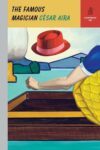 Time Zone J
Time Zone J
Julie Doucet
Drawn & Quarterly
Back to cartooning after shifting her artwork in 2000 to other forms, Time Zone J records a brief but intense fling she had in 1989 with a soldier she refers to as “the hussar.” Deep into Montréal’s zine scene at the time, a fan struck up a correspondence with her, a sense of comradery was established, and soon an erotic charge animated their relationship, even though phones in 1989 didn’t allow for photo swaps. Two problems face the couple: She’s in Montréal and he’s in France, available for furloughs of only 48 or 72 hours, with little warning of their occurrence.
They meet in person a couple of times, the encounters unnerving but not deal-breaking: The hussar is a depressive who likes to cut himself; whether he would do the same to her against her will feeds her uncertainties.
About the cartoons: The drawings look to have been drawn on a scroll that has been folded into 150 uncut pages. The physical continuity of the work along with the narrative add to the book’s energy, which is already amped by the entangled web of images filling each page. The narrative represents Doucet’s obsessive thoughts, mulled over while drawing random faces and objects on a scroll while daydreaming about her fling, pieced together from Doucet’s diaries of the time.
 The Devils
The Devils
New Juche
Amphetamine Sulfate
Taking place in Scotland, where New Juche grew up during the ‘80s but connecting his time in Newbattle with its history of torture and murder and the rape and murder in 2003 of a 15-year-old girl in a house close to where he once lived. The argument behind New Juche’s The Devils is that neighborhoods like the one he grew up in are breeding grounds for such atrocities. More to the point, he implies that crime, casual violence (domestic and public), routine drug and alcohol abuse—let alone torture and murder—are inherent to the historical place of Newbattle.
Spaniels
Jukka Siikala (Jarno Alander, trans.)
Infinity Land Press
Ah, the dissolute life—income and food insecurity, self-destructive turns at overindulgence in drugs and/or alcohol, and bouts of debased sex with anonymous persons of uncertain hygiene. One difference between Orwell’s down-and-out and Bukowski’s boarding house blues is the availability of internet porn, which seemingly overlays every sighting of and encounter with the opposite sex in this book. And given the directionless lives of the characters—who are old enough to know better—a patina of unprovoked violence, of potential energy let’s say, covers every thought and encounter with its sour crust. Here’s the last paragraph of the first chapter as an example:
On his way to the fast-food stand, for no particular reason, the word “death” appeared in his mind, as if alcohol and loosened it from its tethers. He waited at the end of the queue, looking at people standing in front of him, thinking about where on their body he would like to shoot them. Two women turned towards him and one asked for a light. He offered his lighter. Trembling with cold, they discussed their evening. He mentioned living in the next city block. He had booze. The women said they were interested.
Orwell had goals and places to go; Bukowski had no interest in going places but at least had the goal of writing every day. Jukka Siikala, as the 21st-century down-and-outer, has writing skills but seems unconvinced that the skill means anything, any more than a spaniel’s loyalty means anything in a time of empty, libertarian self-satisfaction.
 Shammai Weitz
Shammai Weitz
Isaac Bashevis Singer / Daniel Kennedy
Sublunary Editions
Daniel Kennedy’s translation of Isaac Bashevis Singer is a boon for Singer’s fans for a couple of reasons: “Shammai Weitz” has not been translated into English before, and Kennedy’s English more closely replicates the rawness of Singer’s characters in the original Hebrew that previous translators into English were encouraged to soften by Singer himself into genteel hypocrisies more acceptable to audiences unfamiliar with shtetl life.
Shammai Weitz is one of Singer’s unlikeable characters whose force of motivation propels him toward his end goal, come what may and at whose expense. Weitz and his wife move from an obscure shtetl village in Poland to Warsaw (bright lights, big city), where he sets up business as a printer. His wife never adjusts to the big city, is frightened by all of it, even inside her own apartment. While she continues to wear a wig (one of the Jewish Orthodox traditions), Weitz is no longer wearing his yarmulke by the start of his first meal in Warsaw, and soon is ignoring his wife, as well. Such is his life of assimilation and money-making. Singer, of course, has plans for his callousness.
 The Temple of Gnide
The Temple of Gnide
Montesquieu / Brian Stableford
Snuggly Books
An obscure, minor work by Montesquieu that required two levels of falsification to elude French censors: claiming that the book was published in London, thereby bypassing the requirement that all books published in France pass a censor’s inspection; and that the book was translated from the Ancient Greek, so that its commentary on sexual mores would not seem at odds with current Church pronouncements. Coded this way, even contemporaries of Montesquieu knew how to read the metaphors, which pronounce a desire from Bacchus to humans, on behalf of the denizens of Mt. Olympus, that humans live happy, harmonious lives, rich in sexual gratification and poor in jealousy and mistrust.
 Dark Neighbourhood
Dark Neighbourhood
Vanessa Onwuemezi
Fitzcarradlo Editions
Vanessa Onwuemezi is a young British writer from London whose DN is her first collection, the last story of which, “At the Heart of Things,” won The White Review Short Story Prize 2019. Imagine Kafka reincarnated as an immigrant / first-generation person living in a London tenement and you have an idea of the queasy state of unknowing, dread, and mortal vulnerability Onwuemezi evokes in each story, surreal Sisyphean parables in which something elusive ever escapes the protagonist’s grasp—and this reader’s, for that matter. And while I find no single direct reason to appreciate her poetic prose, its collective effect I can feel: Paragraphs become stanzas and vice versa, spacing introduces silences, rhythms are embedded in the prose—it has a strong oral, performative quality to it. Despite the grim tales that unfold in this collection, Onwuemezi’s ear and control of language bring beauty to the desolate.
 The Famous Magician
The Famous Magician
by César Aira (Chris Andrews, trans.)
New Directions
Stephen King is a popular storyteller who, for decades, has succeeded in keeping millions of readers around the world rapt for hours at a time day after day, months on end. Compared to his competition—social media and streaming services—King has managed an enviable feat of attention-keeping, especially when measured against the internet environment where attention spans are limited to six seconds or less. He is clearly one of the best and most financially successful storytellers alive, working in the realm of plotted novels, often based in or on generic models (horror and fantasy, for instance), models understood and loved by the majority of book readers movie- and theater-goers.
Another type of storyteller, though sadly far less popular, is someone who, also for decades has been writing yarns of 60-100 pages (as opposed to King’s typical 500+ pages), but yarns that just unspool, unplotted, as César Aira, beginning with a premise and a character, sees where such a premise can take such a character, and improvise his way from one thing to another, sometimes arriving back at the subject of his tale, sometimes leaving the starting point far behind. As far as I can tell, people who seem unable to enjoy un-plotted novels are frustrated by the stories not going or ending in directions that satisfy their expectations. I find it frustrating to know already where the dialogue and story are going, and am disappointed every time my stereotyping is confirmed.
I’ll avoid summing up The Famous Magician because (a) spoiler alerts and (b) the point is to get lost in the story wherever the narrator’s thoughts take it, (c) which are usually silly places, and (d) you either enjoy the unusual, improbable, and silly—all told with a straight face—or not. Recommended.
 The Squatters’ Gift
The Squatters’ Gift
Robert Rybicki / Mark Tardi
Dalkey Archive
Polish poet Robert Rybicki was born in 1976, with five years of his adult life spent squatting in an abandoned apartment building:
my philosophy & logic run amok
I’m a trash man from the land o’ yuck
my sour stank keeps everyone at bay
even the squatters will turn me away
I take a detour from the trash collection
my legs decide to make an objection
I, a joyful hobo, wino
pander & gander! (from “Trash Route”)
Rybicki is not, however, a Polish Bukowski. He loves playing with language, words, and their sounds—“POETRY LESSON,” in fact, is all in transcribed or imaginary bird song, and “HAPPY DADA” is a linguistic olio. (And translator Mark Tardi certainly gets the “American” English right.)
But the seriousness behind the silliness is the urge to coax readers into actively, consciously taking in and savoring the uniqueness of the world. Part of the world’s uniqueness, of course, is embedded in oneself, and his poem “In One Moment” pretty much summarizes the attitude toward life he advocates (and which I won’t quote because spoiler alert).
Conformity and social alienation are Rybicki’s enemies: “what’s a poe’m / if it ain’t changed its author,” he asks in “JOIN & JOINT,” to which he adds in “TRASH ROUTE (RECYCLING)”:
cars are cages for people
in the age of people looking away
walking away from each other more rapidly
The age of looking away, of not wanting to engage with others or the empathy that follows, of ignoring other possibilities that experiential knowledge allows. For Rybicki, knowledge “is our consciousness / set aglow by imagination.”
 Palm-Lined with Potience
Palm-Lined with Potience
Basie Allen
Ugly Duckling Presse
A debut collection by a confident poet willing to take on a range of poetic expressions concerning family, society, and being Black in America.
In both physical presentation and word choice, a dialectic of choice is presented to the narrator in many of the poems, a narrator who wants a middle way between stark choices (“I am // genuinely shook / to be drawn / too far to either side / for a great fear // I’ll never make it / bac // k” (“In the Hold of an Uncertain Self”), as long as the middle way isn’t a compromise (“as children / we learned // resilience / from older tress” (“Branch Kids”)). “Nature Walk” begins: “Some people stay up at night wondering what stars are made of / While other people sleep great knowing that most stars we can see / have already died // I’ve never slept.” And in addition to such intellectual wonders is the basic emotional need expressed in “Ember,” a poem about fighting for a mother’s attention over a cigarette. Typed across the page, the poem consists of two groups of words per line, the groups forming columns arched liked facing parentheses. Apart from the vaginal appearance formed by the words, the words offer the ability to be read down from one column to the next or across and thus compound the narrator’s frustration and belittlement at playing second fiddle to his mother’s nicotine addiction.
Yet, Basie Allen’s line are, overall, motivated by optimistic energy, as in these lines from “’Sweet-boy your eyes’ // ‘Keep Going’” intent to instill confidence in the anonymous “you”:
you don’t have to sweet-boy
your eyes
for all the glittery dust
prickle
there’s still room to be anything
Black
sweet-boy your eyes away
from death that isn’t yours
sweet boy your eyes
your eyes can still be
your eyes
Recommended.
 Milongas
Milongas
Edgardo Cozarinsky / Valerie Miles
Archipelago Books
Edgardo Cozarinsky is an Argentine writer and film maker whose slim book Milongas consists of his observations and practice of milonga dances in cities around the world. His focus is more on the dance than the music, and the success in his prose (as adeptly conveyed into English by Valerie Miles) lies in how well it captures the visual quality and physicality of the dancers and others in the small rooms where these dances take place in Krakow, London, Paris, and Buenos Aires. Names of dancers and dance clubs are provided.
Although Cozarinsky distinguishes between malonga and tango—that malonga is strictly dance only and not a music too, whereas tango can be both tango and music—one can malonga to tango. Which may explain Cozarinsky’s chapter on Astor Piazzolla, except—as Cozarinsky points out from the master himself—Piazzolla felt that his tangos were more to be listened to than danced to. Yet Cozarinsky manages to find dancers who have succeeded in doing both, erasing the line between dancer and dance, as all good milongas should do.
Myth has it that tango began among poor and vulgar Argentines, in a brothel in Buenos Aires around 1880. When the dance hit Europe in the early years of the 20th century, however, especially Paris, until the onset of WWI, it was presented as an elegant dance for the upper classes, who required authentic teachers. So prominent a phenomenon gave rise to invited opinions from some of Europe’s opinion leaders, including H. G. Wells (“silly”), Pope Pius X (ambivalent), Germany’s Kaiser (“censure”), and Georges Clemenceau (“The real tango . . . is disappearing” (!)). Argentine dancers soon headed to Europe, where they earned ten times the income as back home, under better working conditions.
And yet according to one contemporary source, the author and Argentine ambassador to France, Enrique Larreta, “There’s at least one ballroom in Paris where Argentine tango is not danced, and that’s the one at the Argentine delegation. . . In Buenos Aires, tango is a dance exclusive to the cathouses and worst variety of lowlife bars. It’s never danced in the ballrooms of polite society or among distinguished people. To Argentine ears, tango music rouses truly distasteful ideas.”
Tango’s homeland was confused by Europe’s reaction to the Argentine atrocity, which was blamed on the great numbers of unwashed immigrants hitting Argentina’s shores and which led to passage of the Law of Residency in 1902, to “honor and respect the pure vestiges of our national assembly [since] every day we are fewer Argentines. . . [T]ango arrives as the urban form of music par excellence, the dance of a city turning cosmopolitan, anarchistic, and unmanageable.”
One prominent Argentine, Carlos Ibarguren, asserted that “Tango is not properly Argentine; it’s a hybrid, or multi-racial product that was born in the slums, it draws on a blend of the tropical habanera and a doctored form of milonga. How far the crude squirm of tango is from the noble, distinguished cueca (Chilean national dance), performed with aristocratic mimicry similar to that of the pavana or the minuet!” Leopoldo Lugones, a prominent authority in Argentina, dismissed tango as “that brothel reptile.”
And yet, over 140 years later, tango—and milongas—still attracts dancers, musicians, and audiences. Cozarinsky’s history of milongas is concise, briskly paced, crammed with facts and telling, interesting examples. And he’s the only author I’ve read who quotes Julien Green (at least three times), a French-American author whose novels and diaries seem to be almost entirely out of print, in English at least. But that’s another story for another time.
